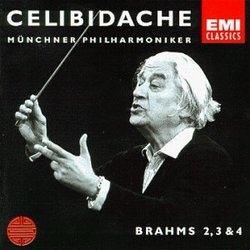| All Artists: Johannes Brahms, Sergiu Celibidache, Münchner Philharmoniker Title: CELIBIDACHE / Münchner Philharmoniker - Brahms: Symphonies Nos. 2, 3 & 4 Members Wishing: 0 Total Copies: 0 Label: EMI Classics Release Date: 8/10/1999 Album Type: Import Genre: Classical Style: Symphonies Number of Discs: 2 SwapaCD Credits: 2 UPCs: 724355684622, 072435568462 |
Search - Johannes Brahms, Sergiu Celibidache, Münchner Philharmoniker :: CELIBIDACHE / Münchner Philharmoniker - Brahms: Symphonies Nos. 2, 3 & 4
 | Johannes Brahms, Sergiu Celibidache, Münchner Philharmoniker CELIBIDACHE / Münchner Philharmoniker - Brahms: Symphonies Nos. 2, 3 & 4 Genre: Classical |
Larger Image |
CD Details |
CD ReviewsOne of two. Roger W. Wood | Jacksonville, Florida | 11/27/2008 (5 out of 5 stars) "Yes, Yes, Yes!!! Celibidache was marvelous on Brahms. I also just heard the 1995 VHS with Sergiu Celibidache and Daniel Barenboim on Brahms great 2nd concerto. Finest performance I've heard of the 2nd. It's in a class by itself. Why isn't it on CD? I haven't heard many performances of the 2nd I have loved, but this one by Barenboim and S. Celibidache is in a class by itself. It produced in me the greatest thrill since I learned the concerto by listening to the faster Richter/Leinsdorf/CSO version as a younger man. I have listened to Brahms for 50 years. I have heard a lot of a lot. And there are few on Celibidache's level beside Wilhelm Furtwangler and the man I will mention next. I agree with those who estimate that Toscanini "Beethoven-ed" (I just created a word.) his way through Brahms. A fatal mistake, even if he Beethovened his way with excellence. Celibidache had a conducting soul-mate called Carlo Maria Giulini when it came to Brahms. Both breathed Brahms. Giulini recording the symphonic circuit on Brahms at least three times to my knowledge with the Philharmonia (of London)on EMI, the LA Philharmonic on DG, and the Vienna Philharmonic (late 80's) on DG. Those of you who cherish Celibidace, as I do, will also cherish his Italian romantic counterpart, who was also one of the 20th century greats on Brahms and a much recorded Verdi sensation. If you love one, you'll love the other. Neither rushed the tempos, and the music just pours forth with excellence. Yes, Yes, Yes!!! Celibidache was great. Now do yourself another favor. Widen your world. Get hold of Giulini's LAPO and Vienna PO performances, and rejoice again. The Vienna performances are, to my knowledge, also live performances. Certainly his Requiem is." Very special Syracuse Violinist | Syracuse, NY United States | 11/30/2007 (5 out of 5 stars) "Celibidache was a truly great musician who, on principle, refused to make edited studio recordings. All his recordings with Munich are live concert recordings. There is great beauty of sound and a wonderful "breathing" flexibility in these performances. I rarely just sit down and listen to a recording--especially of pieces I've played for years and which I know so well. If I do, I tend to be fairly critical and hard to please. I, however, found these performances to be very beautiful and moving. There have been many great recordings of Brahms Symphonies through the years and I would hesitate to recommend one version as "the best". Celibidache, though, is definitely near the top of my list." Eccentric, yes, but there's some special musicmaking here Santa Fe Listener | Santa Fe, NM USA | 07/08/2006 (4 out of 5 stars) "The Celibidache fans have turned out in force for these live Brahms performances from Munich, but if you're not a convert, what should you expect? Many listeners, having read reviews about Celi's glacial tempos, don't sample his many posthumous recordings. That's too bad, because although the conductor had highly idiosyncratic views of performance, hugely influenced by esoteric writings from an obscure German guru, he was a real maestro.
You have to relax and surrender to the very slow tempos here. To compare this Brahms Second with Toscanini's famous mono account with the NBC Sym. on RCA: Celibidache Toscanini 1st mvt. 17:15 14:30 2nd mvt. 13:04 8:25 3rd mvt. 6:02 5:22 4th mvt. 11:01 8:52 Except in the Scherzo, these are huge differences that change the entire complexion of the mood, pace, phrasing, melody, and balance. But just as Toscanini's fleet Brahms creates its own world, so does Celibidache's. Because it's such an extreme world, I find it hard to award stars. You just have to go there. Be assured that EMI's sonics, taken from radio broadcasts, are excellent, and that the Munich Phil, who adored their conductor, play with great passion. They aren't the Vienna Phil, but they don't need to be. The only caveat is that Cli had a method, and therefore these eadings all tend to evoke the same feelings--he's not out to find a unique character that spearates the Second Sym. from the Fourth, for example, unlike other conductors who find the former work pastoral and the latter tragic. This is all Celibidache--a broad, deep river that carries us across a landscape of spiritual loftiness. You may, or may not, be willing to tkae the journey." |
